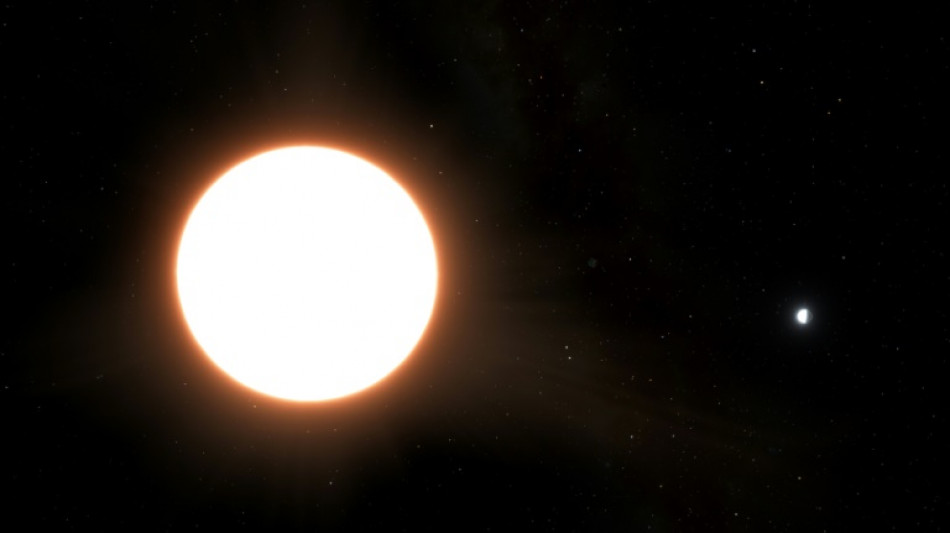
-
 The Crans-Montana fire: a Swiss tragedy that raises questions
The Crans-Montana fire: a Swiss tragedy that raises questions
-
Around 40 killed as fire ravages Swiss ski resort New Year party

-
 Australia's Khawaja to retire after Ashes finale, slams 'racial stereotyping'
Australia's Khawaja to retire after Ashes finale, slams 'racial stereotyping'
-
Frank accepts 'boring' jibes from Spurs fans after Brentford stalemate

-
 Guardiola vexed by Man City's sloppy finishing in Sunderland draw
Guardiola vexed by Man City's sloppy finishing in Sunderland draw
-
Tears and stunned silence at vigil for Swiss fire victims

-
 Wembanyama to miss Spurs' NBA game Friday at Indiana: reports
Wembanyama to miss Spurs' NBA game Friday at Indiana: reports
-
Man City charge stalls at Sunderland, Liverpool held by Leeds

-
 Man City's title bid dented by Sunderland stalemate
Man City's title bid dented by Sunderland stalemate
-
Australia's Khawaja announces retirement from international cricket

-
 Niners seek win for home-field playoff edge into Super Bowl
Niners seek win for home-field playoff edge into Super Bowl
-
New York mayor Mamdani pledges left-wing success after taking office

-
 Slot frustrated by blunt Liverpool in Leeds stalemate
Slot frustrated by blunt Liverpool in Leeds stalemate
-
Toothless Liverpool held by Leeds

-
 Dozens killed as fire ravages Swiss ski resort New Year party
Dozens killed as fire ravages Swiss ski resort New Year party
-
K-pop stars BTS to release album in March ahead of world tour

-
 Fresh clashes kill six in Iran cost-of-living protests
Fresh clashes kill six in Iran cost-of-living protests
-
Nigeria kicks off new tax regime vowing relief for low earners

-
 Dozens killed in fire at Swiss ski resort New Year party
Dozens killed in fire at Swiss ski resort New Year party
-
Leftist Mamdani begins first day as New York mayor

-
 Dozens believed killed in fire at Swiss ski resort New Year party
Dozens believed killed in fire at Swiss ski resort New Year party
-
Brazil Supreme Court rejects Bolsonaro request for house arrest on health concerns

-
 Israel confirms ban on 37 NGOs in Gaza
Israel confirms ban on 37 NGOs in Gaza
-
Russia blames Ukraine for deadly New Year drone strike

-
 Coach Maresca leaves Chelsea - club
Coach Maresca leaves Chelsea - club
-
'Several dozen' believed killed in fire at Swiss ski resort New Year party

-
 China's BYD logs record EV sales in 2025
China's BYD logs record EV sales in 2025
-
Yemen separatists say Saudi-backed forces to deploy in seized territories

-
 Wales rugby star Rees-Zammit signs long-term deal to stay at Bristol
Wales rugby star Rees-Zammit signs long-term deal to stay at Bristol
-
'Several dozen' believed killed in fire at Swiss ski resort New Year bash

-
 Hakimi, Salah and Osimhen head star-packed AFCON last-16 cast
Hakimi, Salah and Osimhen head star-packed AFCON last-16 cast
-
Israel says it 'will enforce' ban on 37 NGOs in Gaza

-
 Near record number of small boat migrants reach UK in 2025
Near record number of small boat migrants reach UK in 2025
-
Several dead as fire ravages bar in Swiss ski resort town Crans Montana: police

-
 Tsitsipas considered quitting tennis during injury-hit 2025
Tsitsipas considered quitting tennis during injury-hit 2025
-
Sabalenka wants 'Battle of the Sexes' rematch and revenge

-
 Osaka drawing inspiration from family at United Cup
Osaka drawing inspiration from family at United Cup
-
Leftist Mamdani takes over as New York mayor under Trump shadow

-
 Israel's Netanyahu among partygoers at Trump's New Year's Eve fete
Israel's Netanyahu among partygoers at Trump's New Year's Eve fete
-
Champagnie, Wemby lead Spurs comeback in Knicks thriller

-
 Eight dead in US strikes on alleged drug boats: US military
Eight dead in US strikes on alleged drug boats: US military
-
Trump joins criticism of Clooney's French passport

-
 AI, chips boom sent South Korea exports soaring in 2025
AI, chips boom sent South Korea exports soaring in 2025
-
Taiwan's president vows to defend sovereignty after China drills

-
 N. Korea's Kim hails 'invincible alliance' with Russia in New Year's letter
N. Korea's Kim hails 'invincible alliance' with Russia in New Year's letter
-
In Venezuela, price of US dollar up 479 percent in a year

-
 Cummins, Hazlewood in spin-heavy Australia squad for T20 World Cup
Cummins, Hazlewood in spin-heavy Australia squad for T20 World Cup
-
Ex-boxing champ Joshua discharged from hospital after fatal car crash

-
 Kamenar to Open for Tom Hamilton of Aerosmith's New Band Close Enemies at the World-Famous Whisky a Go Go - January 3, 2026
Kamenar to Open for Tom Hamilton of Aerosmith's New Band Close Enemies at the World-Famous Whisky a Go Go - January 3, 2026
-
SUPCASE Unveils Its 2026 Brand Evolution: Lighter in Form, Stronger in Purpose

| SCS | 0.12% | 16.14 | $ | |
| CMSC | -0.15% | 22.65 | $ | |
| NGG | -0.54% | 77.35 | $ | |
| RIO | -0.61% | 80.03 | $ | |
| BCC | -0.26% | 73.6 | $ | |
| AZN | -0.63% | 91.93 | $ | |
| GSK | -0.53% | 49.04 | $ | |
| BTI | 0.12% | 56.62 | $ | |
| BCE | 1.05% | 23.82 | $ | |
| BP | -0.06% | 34.73 | $ | |
| CMSD | 0.09% | 23.15 | $ | |
| RBGPF | -0.37% | 80.75 | $ | |
| JRI | 0.22% | 13.61 | $ | |
| VOD | -0.15% | 13.21 | $ | |
| RYCEF | 0.13% | 15.51 | $ | |
| RELX | -1.71% | 40.42 | $ |

'Like a mirror': Astronomers identify most reflective exoplanet
A scorching hot world where metal clouds rain drops of titanium is the most reflective planet ever observed outside of our Solar System, astronomers said on Monday.
This strange world, which is more than 260 light years from Earth, reflects 80 percent of the light from its host star, according to new observations from Europe's exoplanet-probing Cheops space telescope.
That makes it the first exoplanet comparably shiny as Venus, which is the brightest object in our night sky other than the Moon.
First discovered in 2020, the Neptune-sized planet called LTT9779b orbits its star in just 19 hours.
Because it is so close, the side of the planet facing its star is a sizzling 2,000 degrees Celsius, which is considered far too hot for clouds to form.
Yet LTT9779b seems to have them.
"It was really a puzzle," said Vivien Parmentier, a researcher at France's Cote d'Azur Observatory and co-author of a new study in the journal Astronomy and Astrophysics.
The researchers then "realised we should think about this cloud formation in the same way as condensation forming in a bathroom after a hot shower," he said in a statement.
Like running hot water steams up a bathroom, a scorching stream of metal and silicate -- the stuff of which glass is made -- oversaturated LTT9779b's atmosphere until metallic clouds formed, he said.
- Surviving 'Neptune desert' -
The planet, which is around five times the size of Earth, is an outlier in other ways.
The only exoplanets previously found that orbit their stars in less than 24 hours are either gas giants 10 times bigger than Earth -- or rocky planets half its size.
But LTT9779b lives in a region called the "Neptune desert", where planets its size are not supposed to be found.
"It's a planet that shouldn't exist," Parmentier said.
"We expect planets like this to have their atmosphere blown away by their star, leaving behind bare rock."
The planet's metallic clouds "act like a mirror," reflecting away light and preventing the atmosphere from being blown away, according to the European Space Agency's Cheops project scientist Maximilian Guenther.
"It's a bit like a shield, like in those old Star Trek films where they have shields around their ships," he told AFP.
The research marks "a big milestone" because it shows how a Neptune-sized planet could survive in the Neptune desert, he added.
The European Space Agency's Cheops space telescope was launched into Earth's orbit in 2019 on a mission to investigate planets discovered outside our Solar System.
It measured the reflectiveness of LTT9779b by comparing the light before and after the exoplanet disappeared behind its star.
L.Harper--AMWN


